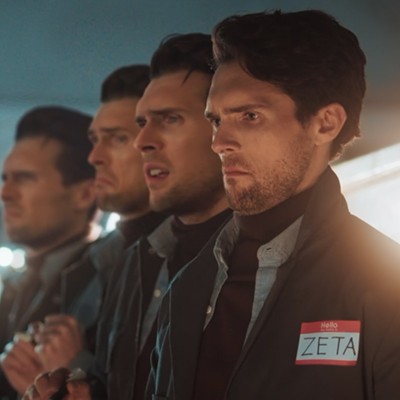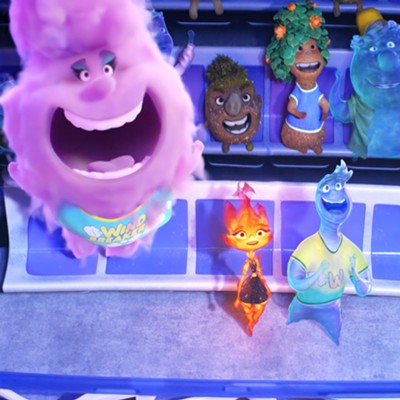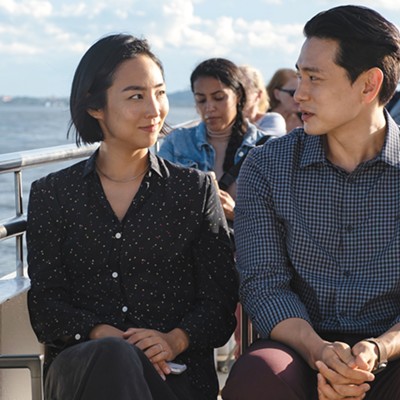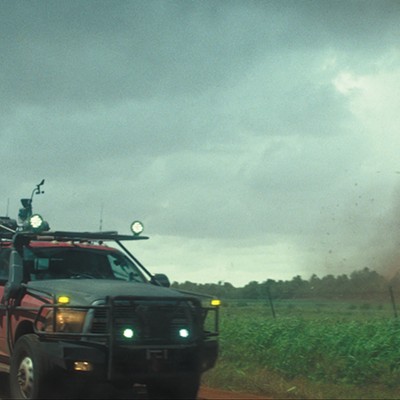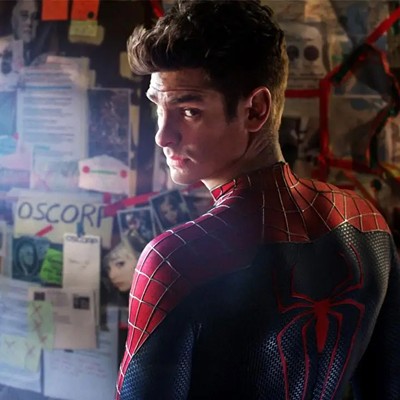It's not every day you see a feature film crew on the sidewalks of Spokane, and it's even rarer to see Spokane actually playing itself on a big screen.
The upcoming indie dramedy All Those Small Things is not only set in Eastern Washington, it's practically an advertisement for the transformative charm of the region. Shot in and around Spokane at the tail end of 2019, it's about a veteran British TV personality, played by Game of Thrones' James Faulkner, who travels to the rural Inland Northwest in the throes of an existential crisis. He's a proverbial fish out of water, a posh gentleman in a landscape of trailer parks and dive bars, but he's soon won over by the eccentric but welcoming locals.
It's an experience that almost mirrors that of the film's writer-director, Andrew Hyatt. Raised in Colorado, Hyatt and his wife moved to Spokane a few years ago to be closer to her family, and All Those Small Things is the first project he's shot in his new hometown. Hyatt's previous feature, the 2018 biblical drama Paul, Apostle of Christ, was filmed in Malta, and he recently wrapped production on a film in British Columbia.
"I've been in places shooting where you're really not welcomed," Hyatt says. "I was just up in Vancouver, and not to knock the Canadians, but there were people who would wander on the set and ask for $500 to walk off set. 'Pay me to get out of here.'"
But over the course of their nearly four-week Spokane shooting schedule, particularly their days working in the Garland neighborhood, Hyatt and his small crew were greeted with the same kind of provincial civility you see in the movie, which is set to be released later this year.
"People on the street were smiling and waving. They would come up and ask, 'What's the film about?' and 'Good luck, let us know where we can watch it,'" Hyatt recalls. "It's hard to summarize how rare that is, that people are just excited, and they're rooting for you. ... The whole town feels involved when you make something here. It's just very special."
Hyatt isn't the only director who has seen the perks of filming in Eastern Washington firsthand, and as the state's movie industry rights itself after a yearlong latency period, more filmmakers will likely be eyeing this area as a prospective shooting location. There's only one thing potentially holding them back: money.
Related
The special quirks of Spokane have stolen the spotlight away from A-list actors in the past. Most famously, Spokane served as the setting for 1985's Vision Quest, a high school sports drama starring Matthew Modine and featuring a cameo from "Like a Virgin"-era Madonna, and 1993's Benny & Joon, in which a Charlie Chaplin-obsessed Johnny Depp cavorted around Peaceful Valley, Riverfront Park and Ferguson's Cafe.
But those were the rare instances of Eastern Washington garnering any attention from studios or TV networks, which by far preferred shooting on the other side of the state (Twin Peaks, Northern Exposure, Sleepless in Seattle).
That changed in 2006, when the Washington Legislature passed the state's film incentive program. Known as the Motion Picture Competitiveness Program, it allows for $3.5 million per year to be disbursed to various film, TV and commercial projects within Washington.
When the incentive went into effect 15 years ago, there was an immediate uptick in regional productions. The first feature to take advantage of the incentive was the 2007 Lifetime comedy The Family Holiday, which starred Full House's Dave Coulier and was filmed in Spokane. Other Inland Northwest-based projects that benefited from the incentive include the actioner Give 'Em Hell, Malone (2009), featuring Thomas Jane and Ving Rhames; the comedy The Joneses (2009), with David Duchovny and Demi Moore; and the John Carpenter horror film The Ward (2010). Spokane also served as the production hub for the post-apocalyptic horror series Z Nation, which recently ended its five-season run on SyFy.
Juan Mas, who has been a filmmaker and producer in Spokane since the early 2000s, recalls the boost in production activity following the incentive's approval. It was like a switch had flipped, he says.
"For us, locally, it was huge," Mas tells the Inlander. "You immediately saw a resurgence of growth within the workforce. More training was available, there was more consistent shooting, and our workforce became very solid and started growing very quickly."
"We were doing three to five features a year," says Rebecca Cook, who has worked on a number of local film sets since the mid-2000s. "That was pretty steady, and that was great work."
In total, the Motion Picture Competitiveness Program has helped fund more than 120 projects in Washington. It also birthed the Seattle nonprofit Washington Filmworks, which also serves as the state's film office and oversees productions that ultimately receive that $3.5 million incentive.
"We are, by definition, the first point of contact for filmmakers looking for locations and resources," says Amy Lillard, who is the state's film commissioner and executive director of Washington Filmworks. "But the heart and soul of what we do is economic development. That's what we look at: How do we keep the film industry working, and how do we create economic development opportunities for the state of Washington?"
It may have attracted more productions to the state, but Washington's film incentive program has sometimes struggled to gain traction within the Legislature. The original bill lapsed in 2011, and while Lillard and other advocates lobbied for its renewal in Olympia, the union-supported film jobs in Eastern Washington slowed to a trickle. It was around that time, Mas says, that he resorted to the freelance route, leaving Spokane behind for monthslong jobs in Louisiana and Los Angeles.
"It makes it hard to be part of a community when you're traveling that much," he says. "And that's at a personal level. On the creative level, I had to focus mainly on whatever gig I could get."
The incentive was eventually reinstated the next year by Gov. Christine Gregoire, but it has been a continuous struggle to keep the bill in play, with Washington Filmworks launching multiple campaigns to highlight the importance of the incentive. In 2017, the incentive was officially renewed for a 10-year period, but the allocated annual budget remains at $3.5 million.
And that's becoming an issue.
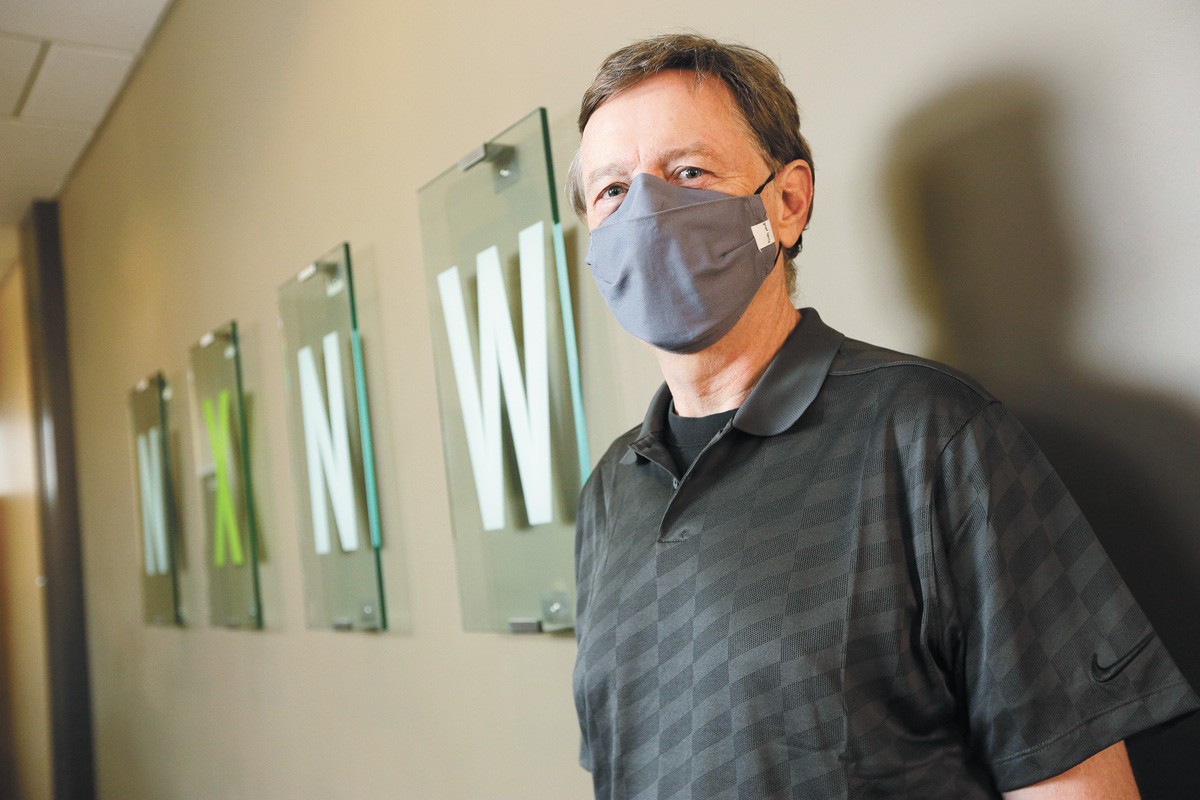
Thirty-six U.S. states now offer incentive programs for film productions, and those with the biggest budgets have (unsurprisingly) attracted the most high-profile projects. Canada has long been a go-to location for film shoots because of its refundable tax credits, and Georgia has followed a similar route: Its generous tax credits have attracted the likes of Marvel Studios and Netflix's Stranger Things to the state. In this corner of the country, Oregon's annual film incentive of $14 million has made it the most popular place to shoot in the Pacific Northwest. Montana, meanwhile, has seen an uptick in productions since the streaming series Yellowstone began filming there, and the Wyoming Legislature is in the process of increasing its $10 million film incentive.
Compare those numbers to Washington's $3.5 million budget, which makes it the third-smallest film incentive in the United States. Washington Filmworks has advocated for a budget increase and has received support from politicians such as Rep. Marcus Riccelli and Commerce Director Lisa Brown, who recently presented a report to the Legislature in Olympia about the economic benefits of increasing the incentive.
"We're constantly in a situation where we are turning business away," Lillard explains. "We're very grateful for the $3.5 [million]. But we can generate so much more economic activity if you increase the incentive. ... [In Oregon and Montana], you can see the correlation between the investment and the incentive, and the investment in the economy. People will start to invest in infrastructure businesses, like trucks and catering, these things that are really important and unique to film."
When Rich Cowan co-founded North by Northwest Productions in 1990, the film incentive was still on the horizon, and most productions that came to Spokane (save for the rare Hollywood hit like Benny & Joon) tended to be extremely low-budget affairs. Since then, North by Northwest has become the region's most prominent production company, co-producing most of the films that come through town.
Spokane has always been known as a "one-crew town," but Cowan is positive that an increase to the annual incentive would also increase the number of film productions in the state. That budgetary change would have a ripple effect, too: Film productions beget more film productions, which would bring about a demand for large soundstages, equipment rental houses and even more union crew members, meaning Spokane could take on multiple productions at once.
Besides, he points out, Spokane is an ideal shooting location through sheer logistics: The airport is only about 10 minutes away from the downtown core, there's far less traffic or travel time than in bigger cities, and the city offers enough geographic diversity to fulfill just about any location requirement.
"There's absolutely no doubt, as the sky is blue 280 days a year here," Cowan says, "that we would be a film mecca. Success breeds success. More people will appear, then we'll go from one crew, to maybe three crews. ... It would be a game changer."
Rebecca Cook is both a board member with Washington Filmworks and president of the Spokane Film Project, a networking organization that connects producers with crews and provides support and education to local filmmakers. She believes that if Washington legislators were willing to increase the incentive, the production capacity in the city would increase seemingly overnight.
"We turn away so many projects at Washington Filmworks because we don't have the money for them," Cook says, noting that there's currently talk about starting a political action committee to bring more attention to Washington film. "That is just a reality. No matter how many ways we approach legislators, it's just maddening."
"There is no question in my mind that if we had had a bigger incentive, that money would get spent, and it would create more jobs and more economic activity," Lillard says. "There are case studies across the United States where if you are a state that invests in this type of program, the business follows."
"It's so competitive out there with these other states, and at a certain budget level, you need to be competitive," Cowan says. "But I'm super optimistic about the future here."
Last year, the state's film industry hit another roadblock in the form of the coronavirus pandemic, and Washington, which had some of the strictest on-set COVID-19 protocols in the country, didn't fund any productions in 2020.
But that unused $3.5 million rolls over to the 2021 budget, thereby doubling the regular incentive. Film production ramped up again this winter, with the historical drama Boon filming in the Inland Northwest in January and February, and Washington Filmworks is currently negotiating for more productions in the summer and fall.
So after a year of uncertainty and dormancy, the future of Washington's film industry looks more promising than it has in a long time.
"I feel like the energy right now is really strong," says Mas, who worked as first assistant director on the set of Boon. "We've got a lot of people looking to come up here and shoot."
One of those people is Karl Schaefer, who co-created Z Nation and worked as showrunner for all five seasons. Schaefer hadn't stepped foot in Spokane before starting production, but Washington offered two big perks: great locations and available funds in the year's film incentive.
The Inland Northwest turned out to be an ideal shooting location for the series, a cross-country odyssey in the midst of a zombie apocalypse, because the city was practically chameleonic. The Spokane River filled in for the Mississippi River in one episode, and scenes in Philadelphia and New York City were both shot on First Avenue (aided by a bit of CGI), and whether scripts called for a mountain range or a desert climate, location scouts could find it here.
"Just by opening up your circle of locations a little bit, you can get deserts and rivers and the Palouse," Schaefer says. "It would have been impossible to do Z Nation in Vancouver or Calgary or Georgia, in my opinion."
Related
Over the course of Z Nation's five years on the air, Schaefer says he noticed a growing camaraderie and dedication among his crew that he hadn't experienced on other sets. In fact, Schaefer was so smitten by Spokane that he's now developing more projects to be shot here, and he hopes that the high profile of Z Nation will draw more attention to the region.
"There's a really strong filmmaker community here," Schaefer says. "They're people that love making movies. ... You get people that have wanted to do this their whole lives. Everybody on our crew moved up a couple of pay grades over the five seasons, became directors, became writers, got to act in the show. We have a pool of directors up here now that are in the [Director's Guild of America], and that wasn't here before Z Nation."
That, again, hints back at Hyatt's film All Those Small Things, in which an out-of-towner is unexpectedly embraced by Eastern Washington hospitality. Hyatt hopes the film won't be his last Spokane-centric story, and that his production company Chi Rho Films will be instrumental in getting the Inland Northwest up on the screen more often.
"In this particular film, two very different worlds collide," Hyatt says, "and it ends up changing the main character's life for the better. If I look at my own life, it's better for living in Spokane than anywhere else in the world. Because of the town, because of the people. And I don't mean that lightly." ♦








